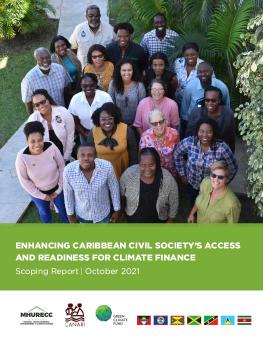
Enhancing Caribbean Civil Society’s Access and Readiness for Climate Finance: Scoping Report
As small island developing states, Caribbean countries are disproportionately vulnerable to climate risks that can instantly erase years—if not decades—of development gains. There is broad recognition across the region that governments will not be able to face these challenges alone. For effective, successful climate action to happen, governments will need help and support from several other stakeholder groups, including local communities, the private sector, international partners and, crucially, civil society organizations (CSOs). This scoping report has been developed to better understand the role of CSOs in climate action and their level of access to climate finance in the Caribbean Community (CARICOM) region.
This scoping report was commissioned under the project, Enhancing Caribbean Civil Society’s Access and Readiness for Climate Finance. The project is being implemented by national designated authorities (NDAs) to the Green Climate Fund (GCF) across seven Caribbean Community (CARICOM) Member States, including Antigua and Barbuda, Belize, Grenada, Jamaica, Saint Kitts and Nevis, Saint Lucia, and Suriname. The Climate Change Division, Ministry of Housing, Urban Renewal, Environment and Climate Change in Jamaica is the lead NDA. The Caribbean Natural Resources Institute (CANARI) is the implementing entity. The project is funded by the GCF’s Readiness and Preparatory Support Programme.
You might also be interested in
What’s Next After UNEA-6: Why “synergies” is more than a buzzword
In an era marked by escalating environmental challenges and geopolitical tension, the Sixth United Nations Environment Assembly (UNEA-6) called for more cooperation to tackle the triple planetary crisis.
UNFCCC Submissions Tracker
Tracking and sharing opportunities for stakeholders to give input to the UN climate change negotiations.
The State of Global Environmental Governance 2023
In global environmental talks in 2023, the focus across nearly all issue areas was funding implementation and reviewing performance.
National State of the Environment Report: Uzbekistan
The National State of the Environment Report (NSoER) is a comprehensive document that provides a snapshot of current environmental trends in Uzbekistan's socio-economic development for citizens, experts, and policy-makers in the country of Uzbekistan.